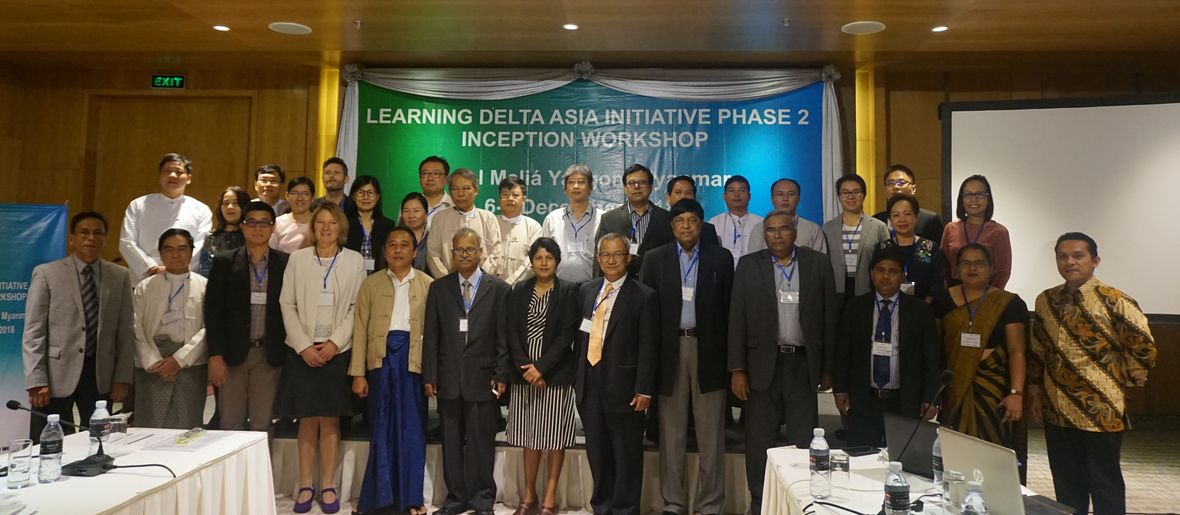The workshop was co-organsied by Global Water Partnership South Asia (GWP SAS) and GWP South East Asia (GWP SEA) while Cap-Net UNDP (an International network for capacity development in sustainable water management) joined the initiative as the main counterpart for implementing Phase II. During the Phase II, a thorough knowledge exchange mechanism between key Asian deltas is expected to be established that will;
• Built knowledge base in place to facilitate knowledge exchange on five key learning areas related to management of Asian Deltas;
• Foster cooperation to develop joint solutions for increased water security and climate resilience in Asian deltas;
• Strengthen the capabilities of local institutions to enhance targeted outreach, impact and sustainability of Multilateral Development Banks (MDB)/Climate Fund co-financed projects and to improve the quality of project pipeline proposals.
Government authorities and decision makers of delta planning and management institutes of some of the Asian countries; Bangladesh, China, Cambodia, Indonesia, Malaysia, Myanmar, the Philippines, Thailand, Vietnam and Sri Lanka and representatives from Regional Water Partnerships (RWP) of SAS and SEA, Country Water Partnerships (CWP) focal points, Cap-Net and development partners who are interested working on Delta management attended the workshop.
The workshop consisted of four sessions, where the first three sessions were dedicated to introduce the LDAI Phase I – the scoping phase, to the regional participants by the two country representatives of Bangladesh and Myanmar, assess programme sustainability and donor perspectives and to identify the relevance across the boundaries. The fourth session was on the way forward - participants were grouped according to the countries that they are representing and asked to gather information on contemporary delta management in each country. In addition, the countries discussed on their relevance to the programme and the specific role they can play to build the South-South and knowledge exchange cooperation. They finally have identified the country priorities in terms of delta management.
Discussions
While discussing the prospects of LDAI Phase II, all agreed to continue with the five learning priorities identified at the scoping phase; flood embankments and polders’ management, preparedness for future climate change and mitigation measures, mangrove conservation and management, tidal river management and Integrated Water Resources Management (IWRM). While the activity grow beyond Bangladesh and Myanmar, the countries would continue to learn and specify their needs.
Cap-Net UNDP as the principal counterpart who expressed their support to implement the capacity development through knowledge product development and delivery, proposed the following design for the phase II and requested feedback from the participants.
Each country delegation was requested to nominate a “Country Focal Point” for LDAI. A formal letter of request indicating the suggested name has to be forwarded by the respective Country Water Partnerships (CWPs) to the Secretaries of the Ministries who work on the subject to get the endorsement from the Governments. It is the Country Focal Point’s responsibility to develop strong linkages with stakeholders at the country level. The proposed Expert Group should also be nominated with the endorsement of the respective governments and will also be followed with a formal letter issued by GWP.
Background
The LDAI programme was started in June 2017 with a Scoping Phase to assess and understand on the challenges and opportunities prevailing in its participating countries, namely, Bangladesh and Myanmar. Scoping phase concluded with identified five learning priorities. The process and the results produced at the scoping phase will be used to scale up the initiative; to learn successes, failures in delta management and development, to promote exchanges of lessons learnt between deltaic countries and to focus on south-south exchange and cooperation.
